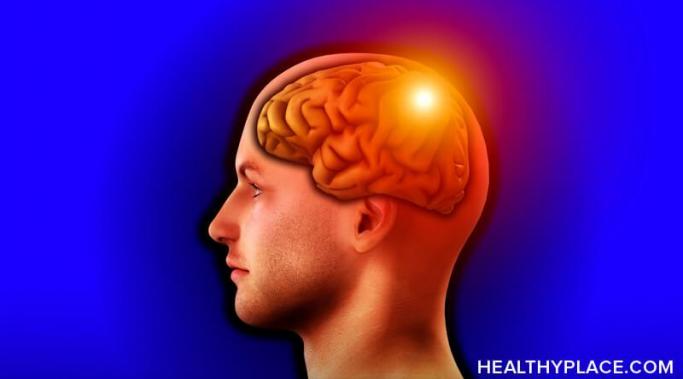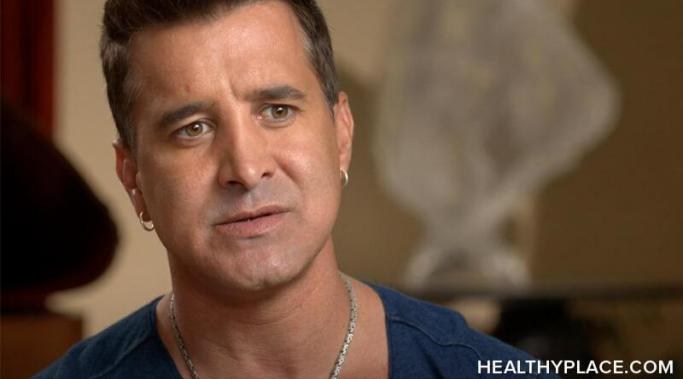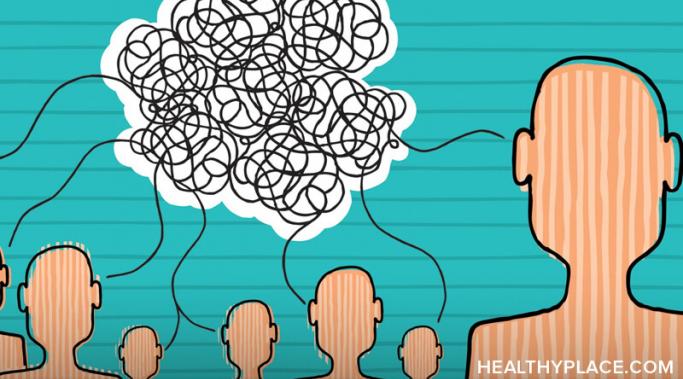I've recently, painfully, discovered that stress increases anxiety to interminable levels. Stress, of course, worsens one's mental health in many ways, but the way that I'm primarily feeling it is through anxiety (and probably depression; anxiety and depression being knitted together as they are). Previously, I didn't have the anxiety problems I do today, and I didn't realize just how bad anxiety could feel until this latest bought of stress increasing my anxiety.
Being Crazy
Mental illness puts thoughts in your head. The fact that mental illness puts thoughts in your head is pretty much the definition of most mental illnesses. If it wasn't for the unhealthy thoughts and feelings that we have, we wouldn't be sick. And just like everyone, we tend to judge our own thoughts and feelings -- even if they're illness-generated. Moreover, the judgment of our own thoughts and feelings often gets translated as a judgment of ourselves. For example, if we judge our thoughts and feelings as unacceptable, then we may feel that we are unacceptable. So, let's take a look at mental illness putting thoughts in our head and how we judge those thoughts.
One of the main differences between bipolar I and bipolar II is that bipolar II experiences hypomania and not mania. Last week I wrote from the perspective of a hypomanic mind, but what is hypomania really? Is hypomania fun or is it just plain crazy?
The holidays can cause a bipolar mood swing. And by that, I mean they can cause a mood episode that wasn't present before the holidays. So, for example, you might have been stable before the holidays, and then depression sets in. You might have been depressed, and then mania sets in. A swing from one mood or euthymia (a state without mood episode characteristics; stability) to another mood is pretty common at this time of year. So, let's take a look at bipolar mood swings during the holidays.
I find pain destroys my ability to think. I find that once pain reaches a certain level, I can no long formulate rational thoughts, and all I can think about is the pain. I short, pain kills my brain. This feels like a curse for someone who uses her brain for a living. However, pain's penchant for affecting one's ability to think is hardly limited to me.
People feel the need to "correct" mental health language constantly. This is mainly a product of political correctness and virtue signaling -- both of which I detest. In fact, talking about mental health and mental illness is like talking through a minefield. Wrong mental illness name -- boom -- you've exploded. Wrong sentence structure -- boom -- you've exploded again. And the thing is, running around correcting mental health language simply shuts down conversation altogether, and it's that exactly the opposite of what mental illness needs? Mental illness needs more open acknowledgment, not people shedding in the dark scared of being publically shamed for incorrectly using words.
When you have bipolar disorder, advocating for your health is even harder. And honestly, doctors are often to blame for this difficulty. Not all doctors are the same, of course, but many treat people with serious mental illness in ways different from other patients. Learn why it's so hard to advocate for your health with bipolar disorder and what you can do about it.
It's hard to know how bad a bipolar episode is when you're living it. That's because it's your brain that is sick. It is your perception that is skewed. Other people may look at you and think it's clear how sick you are and how truly bad a bipolar episode is, but these people are fundamentally missing the problem: you're so sick that you can't see how sick you are.
Recently, I've had to talk about bipolar as a disability way too much. I talk about it online as part of my advocacy work, but that's not the issue. I have no trouble talking about it in general. The issue is talking about my bipolar as a disability in real life. The issue is talking about it to a psychiatrist, to a family doctor, to a nurse practitioner, to whomever I need to in order to get the help I need.
If you've been interacting with doctors as a person with bipolar disorder for more than about a week, you've probably learned the fact that you have to repeat your bipolar story to every doctor under the sun. It's unbelievably frustrating. Mental health professionals treat you like you have never described your bipolar disorder to another person. This is almost never the case. Usually, doctors are asking about your bipolar disorder in front of a huge file outlining your history with bipolar disorder. And repeating your bipolar story over and over is distressing and isn't something we should have to do.









